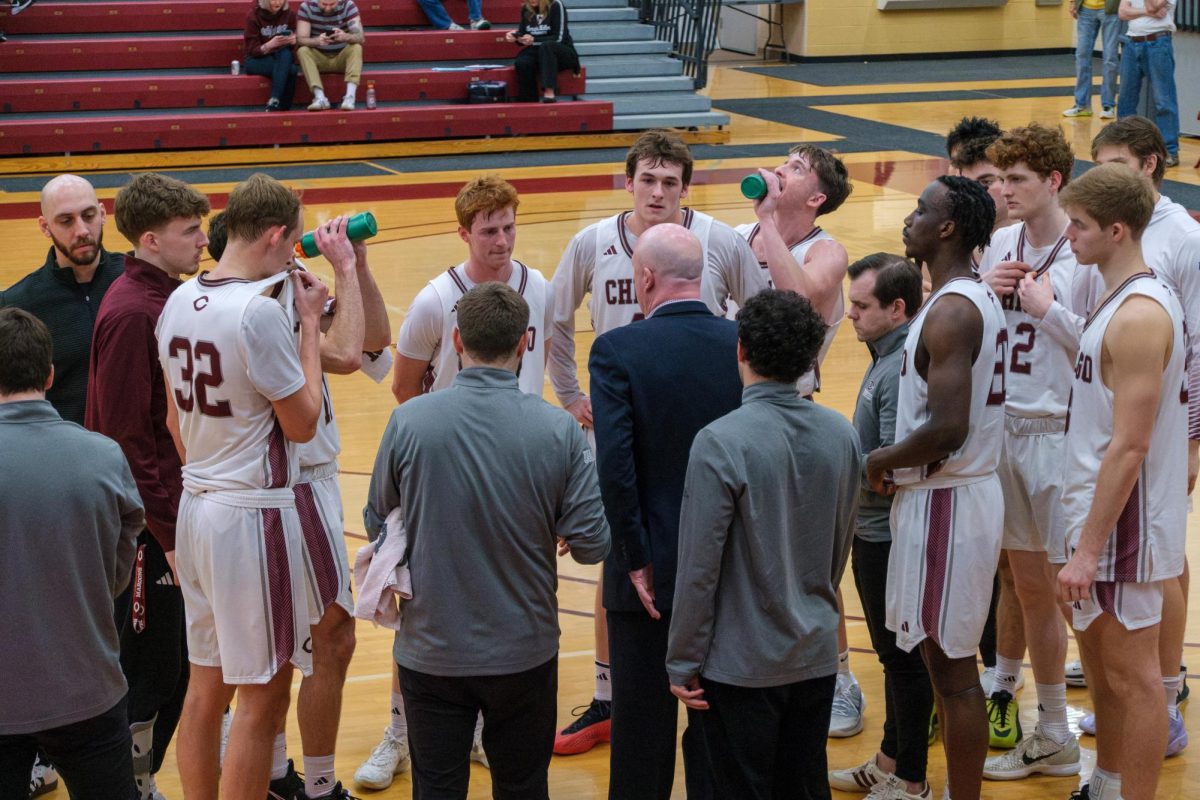As men’s track spends the week attempting to forget their showing at the UW–Whitewater Invite, their counterparts on the women’s squad will be basking in the memory of this weekend’s triumphs.
The Maroons produced split performances at the notoriously competitive UW–Whitewater Invite, which featured men’s events on Friday and women’s races on Saturday. Day One consisted of mediocre performances, while the second day of competition offered three conditional qualifications for NCAAs and one record-breaking race. Overall, the men ended the meet sixth out of seven teams with only 16 points while the women were much more productive, finishing with 69 points for fourth place ahead of UW–Parkside (35) and UW–Whitewater (55).
The men’s unspectacular team score stemmed from the fact that the men’s only top-three finish came from fourth-year Pat Hogan in the 5,000-meter run, as he crossed the line second in 15:04.08.
The high point of the weekend for the women’s squads came with three provisional qualifications for the national meet. Fourth-year Jessica Winter offered the most outstanding race for the women this weekend, taking second place in the 1,600-meter run with a program-record time of 4:56.08. Second-year Aparna Hirve built on Winter’s success when she bounded 11.19 meters into the number two spot in the triple jump, while first-year Olivia Ndyabagye proved her freshman phenom status by finishing second in the long jump with a leap of 5.50 meters.
Complementing their performances was third-year Vidthya Abraham in the 5,000-meter run (second/18:28.46) and the 4×200 meter relay (third/1:48.91). With national qualifiers, a record breaker and even more strong performances, the women are steadily proving to be the squad to watch this season.
If the women were the must-see squadron of the week, Winter was definitely their MVP. Her mile mark missed the automatic qualification standard by less than a second. Winter’s mile on Saturday earned her the much-coveted status of second fastest women’s D-III 1,600-meter runner in the country. Her performance also made her the top indoor miler in school history, having bettered Annette Faller’s (B.S. ‘90) 4:58.75 mark from 1990.
Winter attributed her phenomenal performance to the meet’s impressive line-up, consisting of a veritable Who’s Who of Midwestern Division III track. Combined with a strong base gained during cross-country and off-season training, Winter went into the race in great physical shape with a solid strategy
“The competition was the best I’ve seen this year,” Winter said. “The strategy was simply to run the correct splits for each lap, 37.5 seconds per 200 meters for a 5-minute mile. It felt easy for the first half mile and then got progressively more difficult. But I feel much stronger at the ends of races this year than last year.”
Winter led for the first 1,200 meters, maintaining a 75-second-per-quarter-mile pace. After UW–Parkside second-year Naomi Bong took the lead with only 400 meters remaining, Winter pulled off an agonizing 70-second final quarter to close in on Bong (4:54.41) and hold off UW–LaCrosse third-year Kristen Painter. (5:00.10)
While Winter faced stiff opposition on the track, Hirve and Ndyabagye went head to head with some formidable foes of their own in the field events.
“Whitewater was more competitive than our meets in the past,” Hirve said. “We were up against some national-caliber athletes in the jumping events.”
For Hirve, Saturday was almost an exact repeat of last winter’s UW–Whitewater Invitational, where she qualified in the same event. Hirve’s qualifying mark in 2004 was similarly just barely above the provisional standard and was once again achieved on her final jump.
Like their fourth-year teammate, Hirve and Ndyabagye are only provisionally qualified, and are not guaranteed spots at the national meet. Unlike Winter, their positions are not promised. Hirve, ranked 12th nationally, surpassed the provisional standard by one centimeter. Ndyabagye, ranked 10th in the nation, is in a slightly better position than Hirve, but will also have to further improve her performance in upcoming meets in order to hang on to her chance to jump at NCAAs.
“I know I can go at least a foot or more further, and I have three more meets to do this,” Hirve said. “My mark right now is almost guaranteed to not be good enough to get me into the meet, so I’m still nervous that time is running out. I have to push myself to do even better in order to make it back again this year.”
Ndyabagye is trying to maintain a cool head about Nationals. The former New Mexico high school state long jump champion is also focused on improving her performance in the three meets leading up to nationals, but attributes her quality showing on Saturday to her focus on continual improvement and intends to do what she’s been doing all season to cinch her spot at NCAAs.
“I’ve never thought about qualifying for nationals,” Ndybagye said. “I thought about jumping better each meet and beating my own personal record. I think every meet is different and I want to strive for the best.”
The men’s team, on the other hand, is eager for a few improved performances after the weekend’s defeat. Third-year Emil Bojanov (4:18.37), who finished fourth in the mile on Friday, provided a national qualification early in the season at the Chicago Invite. As of now, none of his compatriots on the men’s team will be joining him. With the end of the season on the horizon, the men are bearing down, focusing on running the necessary times and throwing and jumping the required distances to earn a spot at NCAAs.
The men, like the women, have three chances left to qualify for nationals, and will up the competitive ante starting on Saturday at the Chicagoland Championships. While the women take to the track in Romeoville on Saturday hoping to repeat Saturday’s success, the men will be competing at Henry Crown the same day striving to reverse Friday’s outcome.








